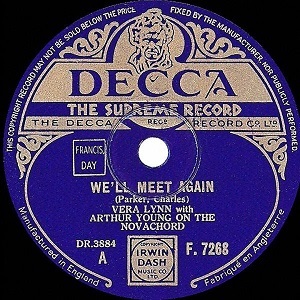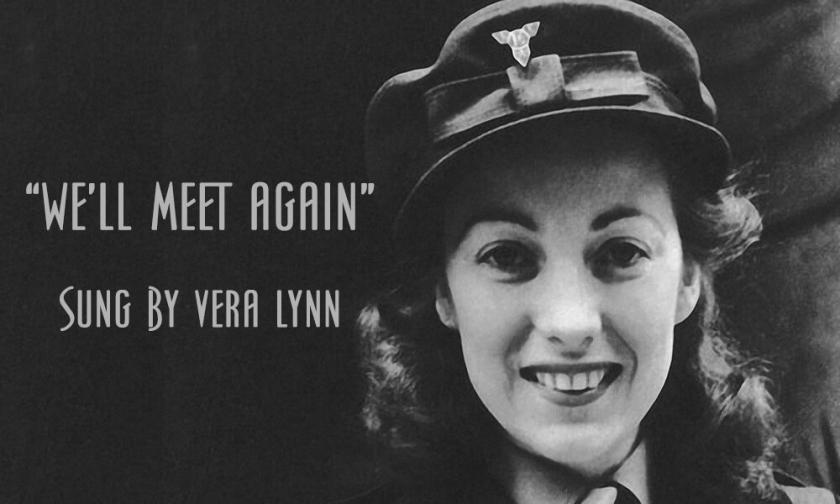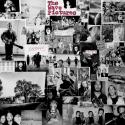Last Sunday evening I was making lentil soup (words I never thought I’d type) when Radio 4’s discussion of wealth, or lack thereof, gave way to a profile of Dame Vera Lynn. She was “trending”, her NHS fundraising duet with Katherine Jenkins of “We’ll Meet Again” having hit number one on iTunes. A mash-up of the song, in aid of West End artists, is to follow.
I resisted the urge to switch stations and listened as presenter Mark Coles chatted to friends and family, including daughter Virginia, who revealed that her mother is often trilling away (in tune) at 11.30 at night as she gets ready for bed. At 103, that showed spirit! I also learned that as a toddler Vera was hospitalised for three months with diphtheria, singing recommended as a way to strengthen her lungs. The 15-minute programme concluded with a wartime recording of her most celebrated song, “We’ll Meet Again”.
Suddenly I was crying.
The facile explanation would be Noel Coward’s “extraordinary how potent cheap music is”, which may be unfair, but it certainly demonstrated the power of music to transport you back in time, dimly remembered moments returning in bright Technicolor. Poignant, painful, bittersweet, unsettling: disturbing my hard-won equilibrium.
Dame Vera’s new currency and chart success was prompted, of course, by the Queen’s Coronavirus broadcast. I’d bothered to tune in and watch live and like most people thought it rather striking. Her mention of wartime evacuees was a far more subtle evocation of the so-called Blitz spirit than is usual. And then came that pitch-perfect peroration: “Better days will return: we will be with our friends again; we will be with our families again; we will meet again.”
Born into the late 1950s, mine was a typically post-War childhood. My father had served on Atlantic and Arctic Convoys, my mother had been a nurse, mostly TB – almost as frightening then as Covid-19 is now. They had met in Liverpool, at a tea dance, and the music of their youth competed on radio and TV with that of my sister’s, a child of the baby boom who experienced the first flush of Beatlemania. Hard as it is for millennials to imagine, for most of the 20th century there were only a small handful of stations and channels, and listening and viewing was done as a family.
I grew up with programmes that seem laughable now. On Sunday lunchtimes the vast majority of the population gardened, washed their cars and cooked the roast beef and Yorkshires to Family Favourites, the peace-time continuation of Forces Favourites on which the likes of Bing Crosby, the Andrews Sisters and Vera Lynn (the damehood didn’t come until 1975) jostled for airtime with representatives of what was then “the hit parade”. Lynn frequently popped up on TV shows and had her own series. And of course, whenever there was a War-time commemoration, she was always there. Omni-bloody-present. How Maureen and I enjoyed mocking it all!
 Our parents weren’t particular fans – my mother preferred Anne Shelton and Deanna Durbin as singers, and they both liked the dance bands – and I don’t think our attitudes caused upset. But I realise now that it wasn’t really about the music – it was the memories that music evoked. And I understand now as I could not have done then that World War Two was such recent history for them. The Beatles’ first LP is now almost 60 years old. In 1965 the War had been over but 20 years. The blink of an eye! I realise, too late for either of them, that I was probably never respectful enough of what they went through even though I was brought up with the history. Maybe my tears were in part an expiation of guilt.
Our parents weren’t particular fans – my mother preferred Anne Shelton and Deanna Durbin as singers, and they both liked the dance bands – and I don’t think our attitudes caused upset. But I realise now that it wasn’t really about the music – it was the memories that music evoked. And I understand now as I could not have done then that World War Two was such recent history for them. The Beatles’ first LP is now almost 60 years old. In 1965 the War had been over but 20 years. The blink of an eye! I realise, too late for either of them, that I was probably never respectful enough of what they went through even though I was brought up with the history. Maybe my tears were in part an expiation of guilt.
But were they also a response to the song itself, or even to Dame Vera’s voice? Was something more than pure nostalgia and discomfiting memories at work?
In fact, despite myself I remember thinking way back when that her voice had a yearning, keening quality to it and a “catch” that must have been very emotive when (to coin a phrase) the lights went out all over London. The comparisons may appear laughable, but these are vocal qualities shared with Edith Piaf (whose voice was more uniquely emotive and expressive than conventionally beautiful) and Patsy Cline, though both were far more formidable and ground-breaking singers who recorded many truly iconic songs. They were stylists, which I don’t think (even by the standards of her heyday) Lynn ever was, nor probably ever tried to be. She was simply being herself, so she sounds sincere, which was surely what “the boys” (as she always called them) and their girls back home in Blighty responded to. Her somewhat mournful voice was relatively low, which gave it warmth, and had a hint of vibrato. Her pitch and phrasing were always assured, her diction crystal clear – and if she sometimes sounded like someone for whom English is a second language it’s doubtless because she grew up Cockney. She was, essentially, a crooner, a term more associated with male singers.
Her catalogue is extensive and she ranges widely. There are children’s songs, Christmas songs, sacred songs – even a mid-Seventies album recorded in Nashville at Bradley’s Barn, musicians including guitarist Pete Drake, who played with Bob Dylan, and the Jordanaires, who sang with Elvis Presley. But it’s very much country music for Saturday-night TV audiences whose notion of country was Jim Reevesian. The song selection and sub-Mantovani-esque arrangements were dubious, though she makes a half-decent fist of the Cindy Walker-Eddy Arnold classic “You Don’t Know Me”. And she sounds so terribly English!
As to “We’ll Meet Again”, it was written at the outbreak of the Second World War by Ross Parker and Hughie Charles and, surprisingly, it’s been covered by PJ Proby, The Byrds (all twelve-string guitars and weird harmonies) and Johnny Cash. Unlike “There’ll Always Be An England”, Parker-Charles’ other big hit, recorded by Lynn at much the same time, “We’ll Meet Again” is melodically and harmonically rather striking, the opening verse rising chromatically in triplets before dropping a fifth for another chromatic phrase, this time without the triplets. But in addition to the relatively rich harmonic palette (based loosely around the circle of fifths) and lots of passing chords, what makes the song memorable is the so-called aspiring sixth (on “don’t know when”), an interval made all the more distinctive here because so much of the melody proceeds in semitones. The aspiring sixth is the musical interval around which "My Way" is constructed.
Lynn’s other great hit “(There’ll Be Bluebirds Over) The White Cliffs of Dover” is less adventurous harmonically, rooted in a simple chord structure (tonic, dominant and subdominant, plus their relative minors) that suggests solidity and resolution – the song was written and recorded in 1941, Britain’s “darkest hour”. However, the wide intervals of the chorus again feature that aspiring sixth (at “the white cliffs”). The song is gloopier by far, unthinkable at any other time, and it’s long been co-opted to mean something else entirely. Indeed, in 2009 Dame Vera attempted to sue the British National Party for its use of the song on a fundraising CD – she lost because her recording was out of copyright.
The current death-filled, dread-filled crisis has given us a taste of what our parents and grandparents went through. In March as we began to face up to the grim reality, I wondered, not for the first time, how that summer of 1939 must have felt as war clouds gathered. Just after my father’s death, his oldest schoolfriend sent me a photo of him larking about on the beach, dated on the back “July 1939”. He looked so young and carefree but within months he’d volunteered. Vera Lynn too, of course!
On 13 March, I saw Elvis Costello at what I still think of as the Hammersmith Odeon. The spectre of the newly announced pandemic hung over the concert, which Costello had expected would be cancelled. It ended with the audience pumped up and cheering, but it felt like the last hurrah for some time, which it was. The 10 days that followed were our “phoney war”. Then came the lockdown.
Our parents and grandparents danced through the Blitz, to Vera Lynn singing with Ambrose and much besides. Yet for us the band does not play on. I fear it won’t strike up for some time.















Add comment